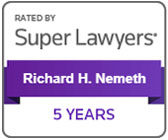DISCHARGING DEBTS ARISING FROM “BAD CONDUCT”

DISCHARGING DEBTS ARISING FROM “BAD CONDUCT”
One question that we’re commonly asked, especially now that a number of casinos have opened in northeastern Ohio, is whether or not gambling debt can be cancelled in bankruptcy. The answer is yes, it can.
This might seem odd to some people, but the courts have universally held that losing money in games of chance does not constitute any sort of misuse or abuse that would affect a person’s ability to cancel those debts in bankruptcy. So for your average Joe, cancelling gambling debts in bankruptcy is no problem.
Now, for you high rollers out there – there could be other issues you’d have to consider. For example, some casinos have lines of credit known as “markers” that give a gambler the ability to engage in high?stakes gambling without having to bring a suitcase full of cash to Las Vegas. Under Nevada law, the failure to repay a marker is a crime, and the casinos take this very seriously. Bankruptcy does not cancel criminal penalties like fines and restitution orders. So if you fail to pay a marker, the Nevada criminal court will issue a restitution order which would not be cancelled by a bankruptcy proceeding and you would be required to pay.
Also, keep in mind that it is not always possible for every person to cancel debts in full in bankruptcy. For example, a person who earns a lot of money or owns substantial assets may be required to file the kind of bankruptcy in which some money is paid back to creditors. But again, for the average Joe, gambling debts can be cancelled in bankruptcy.
DEBTS ARISING FROM IMPAIRED OPERATION OF A VEHICLE
If you owe money for property damage that arises from an impaired driving accident, the debt can be canceled in bankruptcy if your insurance company will not cover it. So damage to other vehicles, buildings, utility poles and other objects that arise from drunk or impaired driving can be discharged. However, personal injury and wrongful death liability cannot, with one big condition: If you file bankruptcy and owe a personal injury or wrongful death claim, the victim or his or her family must come forward in your bankruptcy case and file a lawsuit against you and obtain a judgment from the bankruptcy judge specifically ruling that the claim is not dischargable. This is because personal injury and wrongful death liability is dischargable without a ruling that it is not. Sometimes, victims or their families are not willing to go the expense to hire a lawyer to file that case, partly because the end result is that the debt is ruled non-dischargable in the bankruptcy case; that does not mean that you have the ability to pay it and the bankruptcy court will not enforce payment. So it is a common strategy to file bankruptcy and list among the debtor’s debts personal injury and wrongful death claims arising from impaired driving and in some cases those claims get discharged for failure on the part of the victim to do anything.
FINES, RESTITUTION AWARDS, PENALTIES IN CRIMINAL PROCEEDINGS
Fines, restitution awards and penalties in criminal proceedings arising from impaired driving incidents are never dischargeable. It is not necessary for a party to come forward and obtain a judgment in bankruptcy court.
FRAUD, MISREPRESENTATION, FALSE PRETENSES
If you incur a debt through fraud, misrepresentation or false pretenses, the debt is not dischargable. However, this is another category of bad behavior debt that requires the victim/creditor to file a lawsuit in the bankruptcy proceeding and have the court make a ruling that the claim cannot be discharged. Many times they are not willing to do so, especially given that the person is bankruptcy, by definition, has little or nothing with which to pay the debt. Also, high income debtors may not be able to cancel debts outright in bankruptcy because of the ability-to-pay limitations [see above].
WILLFUL AND MALICIOUS INJURY TO A PERSON OR PROPERTY
If you intentionally injure a person or damage his or her property, and if you get sued for it and a judgment for damages is entered against you, you will not be able to cancel that debt by filing bankruptcy. However, this also is the kind of debt that requires a bankruptcy court judgment in order for the claim to be rendered non-dischargable. Our experience has been, however, that creditors that have been the victims of physical attacks or vandalism or other attacks on their property are motivated to file a lawsuit in bankruptcy court to have the debt ruled non-dischargable. And again, there may be abiltity-to-pay considerations.
THEFT, EMBEZZLEMENT, LARCENY, BREACH OF FIDUCIARY DUTY
Debts arising from stealing, embezzlement, and breach of fiduciary duty are also non-dischargable, but the victim must file a lawsuit and obtain a judgment in bankruptcy court. Sometimes they do; sometimes they don’t. Filing bankruptcy may be worth a try. But here again, there may be ability-to-pay issues.

